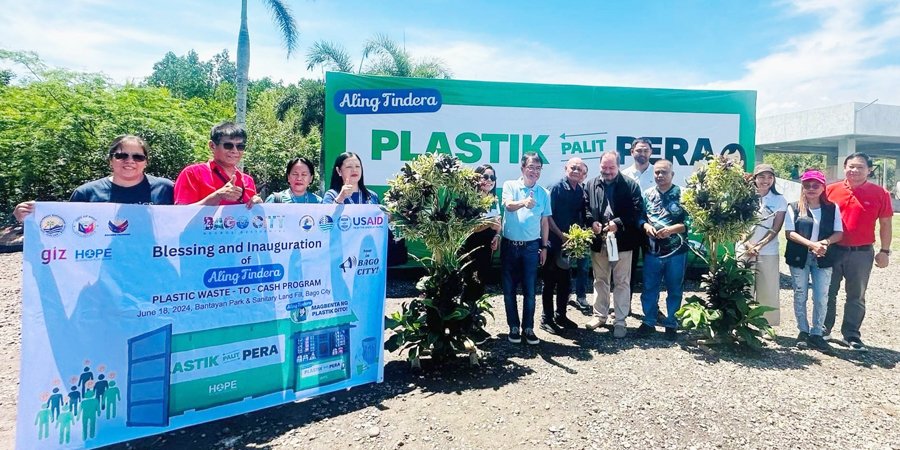In a bid to boost its environment protection and preservation efforts, particularly on reducing plastic waste, the city government of Bago has pioneered the implementation of a community-based waste-to-cash program in Negros Occidental.
Dubbed as “Aling Tindera” plastic waste to cash, the program is in partnership with impact organization Friends of Hope Inc. (FHI) and the Germany-based development agency Deutsche Gesellschaft für Internationale Zusammenarbeit (GIZ).
It aims to provide an avenue where people can monetize plastic waste, to encourage discipline in the treatment of post-consumer plastics, reduce leakage into the environment, and educate future generations about the benefits of co-processing, recycling, and other high-level waste management processes.

Vice Mayor Ramon Torres, with other local officials and representatives of partner-organizations, led the launching of the project in barangays Ma-ao and Poblacion June 18.
Two “Aling Tindera” waste collection stations are located near the city’s sanitary landfill in Sitio Pandan in Barangay Ma-ao, and beside the fish port at the Bantayan Park in Barangay Poblacion.
“Aling Tindera” program coordinator Mia Rosabel Grace Azurin said the plastic pollution crisis is mainly due to the use of single-use plastics, like sachets, adding the Philippines is one of the worst offenders on marine pollution.
Azurin said the collection program aims to help the community manage their own plastic waste at home, at the same time give additional income to the designated “Aling Tinderas”, who will manage the waste collection stations and their respective community members.
The “Aling Tindera” stations will buy plastic sachets, packaging materials, and containers, among other plastic waste, from residents at P2 per kilo, Azurin said, adding that partner-organizations will then buy it from the stations at P2.50 per kilo.
“It’s a big milestone today as the vision of Bago City comes alive and we are happy to be part of it,” GIZ-3RproMAR project manager, Dr. Johannes Paul, said in a city press release.
Torres stressed the importance of working hand in hand in the protection and conservation of the environment through supporting programs, like the “Aling Tindera”, to help address plastic pollution.
City Environment Management Office (CEMO) head Vicente Mesias said they are eyeing to open more “Aling Tindera” stations in the city, adding that the project will surely have positive social and environmental impacts to the community.
The city government, meanwhile, inaugurated its sanitary landfill expansion site, in Barangay Ma-ao, also on Tuesday.
The P50-million expansion project includes a new materials recovery facility, a new water treatment facility, a septic vault for hazardous waste, compost pits, storm drains, and an administrative building.
Mesias said the four-hectare expansion site, in addition to the existing eight-hectare facility, is expected to accommodate additional waste generated in the city.
“But with the Aling Tindera program, we are looking at reducing our waste generation and lessen the volume of garbage being disposed of at the sanitary landfill,” he added.
The launching of the “Aling Tindera” plastic waste to cash program, as well as the blessing and inauguration of the sanitary landfill expansion site are part of the city’s Environment Month celebration, on the theme “Our Land. Our Future. #GenerationRestoration”.
Also present during the activity were councilors Ma. Josefa Matti, Jake Patrick Torres Ma. Femmy Alvarez-Martir, and Carlos Mondia, ABC president Jovito Gahaton, executive assistant Jom Somcio, and former councilor Jorge Araneta;
Personnel of the Provincial Environment and Natural Resources Office, Provincial Environment Management Office, and the Community Environment and Natural Resources Office, the barangay councils of Ma-ao and Poblacion, representatives from the University of Saint La Salle Bacolod and La Consolacion College Bacolod, and other stakeholders, among others. ||




